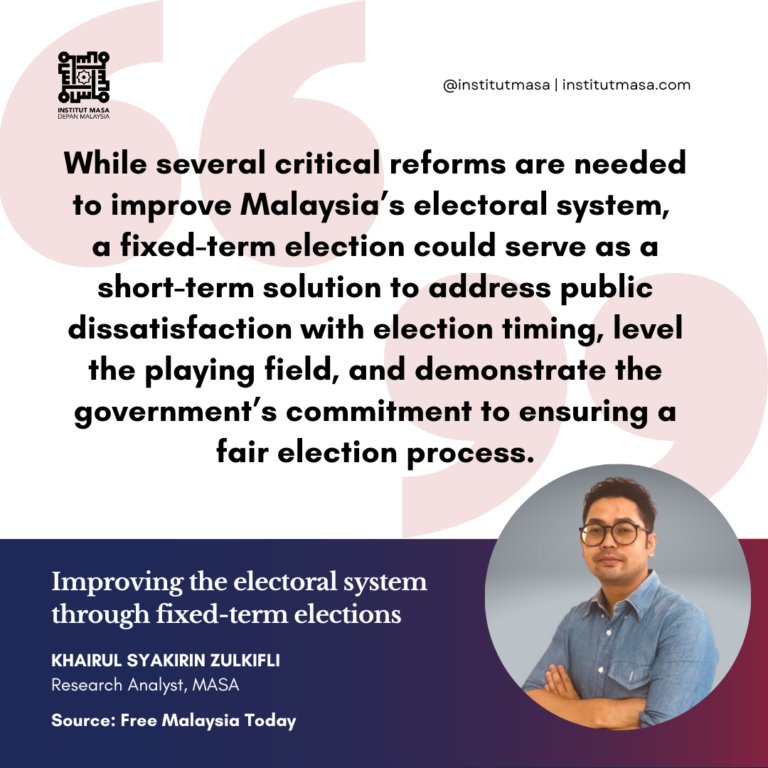Oleh Khairul Syakirin Zulkifli
One of the most important reforms critical for short-term implementation in our electoral and regulatory systems is to set a fixed-term election.
A fixed-term election, particularly the general election (GE), must occur on a specific date and cannot be modified except under constitutional provisions.
In the Federal Constitution, Article 55 (dissolution of Parliament within five years unless the Yang di-Pertuan Agong allows a snap election) and Article 43(4) (early dissolution of Parliament is permitted if the prime minister loses confidence) pertain to the holding of a GE.
Another relevant provision is Article 40(2)(b), which states that the king can act at his discretion to withhold consent to a request for the dissolution of Parliament.
Current discourse on fixed-term elections is also debated partly under the Fixed-Term Parliament Act (FTPA), which is now being reviewed by the Prime Minister’s Department (law and institutional reform) to block any change in the existing government until the next GE, albeit with mixed reactions.
The key to dissolving Parliament remains in the hands of the prime minister. This incumbency advantage allows the ruling government to control the timing of the election period vis-à-vis the probability of winning the election.
Despite various efforts from some sides to push for fixed-term elections to be implemented by the Election Commission (EC), the public has yet to receive any convincing updates. A fixed-term election should be one of the short-term reforms to level the playing field as it does not require large structural changes in the EC and other government institutions.
It would address many problems faced by the EC, government institutions, voters, and political parties. A surprise election date would put considerable financial stress on the EC in holding the election. It cost RM725 million to hold GE15 and RM420 million to organise the six state elections last year.
The current system is highly disadvantageous to EC staff, especially part-timers. They struggle to learn about rules and matters pertaining to election conduct due to insufficient time, especially in dealing with counting agents and representatives of all political parties. It is also difficult for EC staff to plan their schedules ahead.
Voters would benefit greatly from this reform, and one significant advantage is that it will enhance the normative reality for voters, making it easier for them to vote and fulfil their national responsibility.
It is estimated that more than 400,000 voters would have to return to their hometowns to vote, and they would have to endure hours of travelling just to vote.
Voters who need to return to their hometowns may face significant traffic congestion, and employers and employees might struggle to adjust their work schedule, making it challenging to plan leave applications.
A surprise announcement of the election date can negatively impact voters’ lives. It can disrupt university, vocational, and school schedules and may force families to postpone vacations. Sabahans and Sarawakians, who already face high flight costs (though these issues could be addressed through advance voting, special voting arrangements, or changes in the national registration address policy), would benefit from having more time to make the necessary plans.
Sudden announcements might discourage voter participation, leading to low turnout as seen in Sabah, Sarawak, and Kelantan during GE15. Overseas voters are also affected as they might find it difficult to secure runners or NGOs to deliver their votes to the polling centres.
A fixed election date would simplify budgeting, documentation, and logistical planning for small parties and independent candidates. Establishing election centres, procuring vehicles and equipment, and training party workers are challenging and costly, which tend to favour larger, well-funded parties.
A fixed date would provide parties with adequate time to select candidates, develop strategies, and draft manifestos. It would also help reduce economic uncertainty for businesses, allowing them more time to plan and monitor political activities.
Globally, many countries use fixed-term elections or maximum term lengths. For instance, the US, South Korea, and Norway use fixed-term elections. South Korea, for example, has already set a provisional date for its next election.
The UK, Australia, New Zealand, and Denmark use maximum term lengths, though election timing is often determined by the prime minister. In 2023, New Zealand announced its election date eight months in advance.
As Malaysia practices parliamentary democracy with a constitutional monarchy, any reform must include securing approval from the Yang di-Pertuan Agong, based on the prime minister’s advice as outlined in the Federal Constitution.
Adopting a fixed-term election system requires careful consideration of the FTPA and the pros and cons of various global practices.
While several critical reforms are needed to improve Malaysia’s electoral system, a fixed-term election could serve as a short-term solution to address public dissatisfaction with election timing, level the playing field, and demonstrate the government’s commitment to ensuring a fair election process.




